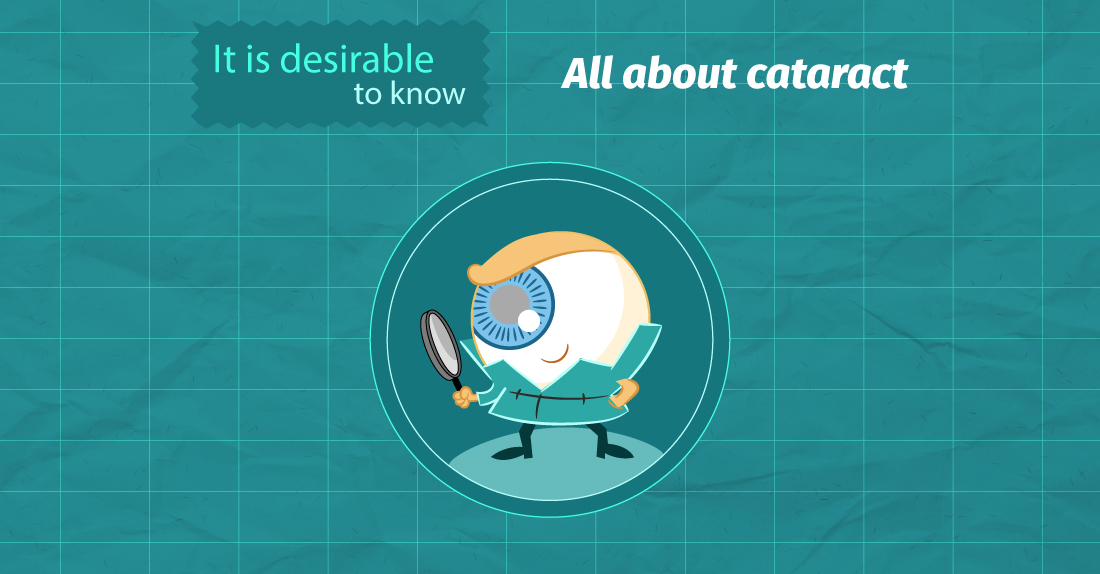
All about cataracts
What is a cataract?
A cataract is a clouding of the optical structure of the eye - the ''lens''.
When does cataract development begin, and what causes it?
The initial transparency of the lens is lost as a result of alterations to the protein structures within the lens. Beginning at age 50, this process advances progressively.
There are cases when cataract progression begins at an earlier age, but at this time, as a rule, the patient's history indicates various chronic diseases (diabetes, autoimmune diseases). Cataracts can also be congenital or acquired as a result of trauma.
Which symptoms should a patient look out for in order to make an appointment with an ophthalmologist as soon as possible?
A progressive decline in distant vision is a hallmark of cataracts in the lens. In order to read writing on a wall that is 30 meters away, a patient must approach the writing more closely. People who utilize public transportation can no longer see the bus number from a distance, and drivers frequently complain that their vision deteriorates at night. Colors become less clear and object shapes become hazy. When cataracts develop in one eye before the other, patients frequently forfeit the ability to judge distance due to the visual impairment.
They have trouble moving around in space, although they can see objects. When a patient with advanced cataracts can no longer distinguish writing within a few meters but can read without glasses, it is a temporary condition that lasts for a few months. By this time, the lens is already very cloudy, and surgery is necessary right away to prevent vision loss, both up close and at a distance.
Therefore, get in touch with us right away if you observe that your relative, who is 80 years old, starts reading without glasses.
What is the process for treating cataracts, and how long does it take?
The flawless execution of contemporary cataract surgery shortens the recovery time. Thanks to advancements in technology, the procedure now takes only five to seven minutes. A specially chosen lens is implanted into the patient's eye after the hazy lens has been crushed and removed. The fragmentation and removal of a highly turbid crystal takes more time and effort when the patient presents late, resulting in a prolonged rehabilitation period.
What are the outcomes of cataract surgery, and how long does it take to prepare?
After cataract surgery, light beams will be able to reach the retina through the lens without obstruction, greatly improving vision. Laboratory tests, a cardiological examination, and the required ophthalmological examinations are performed on the patient prior to the procedure.
Does the procedure involve any contraindications?
Cataract surgery is not an option for certain uncommon eye disorders. Surgery is either impossible or difficulties are expected in situations of viral inflammatory processes, severe forms of glaucoma, corneal dystrophic processes, and other severe disorders.
Is it necessary to take drops continuously after surgery?
It is not necessary to take drops continuously after surgery.
What is the duration of the rehabilitation period?
The patient receives a variety of eye drops throughout the one to four week rehabilitation phase. When concurrent conditions like glaucoma and diabetic retinopathy are present, the length of rehabilitation frequently varies. In these situations, the patient is prescribed a particular treatment, and the rehabilitation period may be slightly longer.
Is cataract surgery funded?
This procedure is funded for patients with private insurance and beneficiaries of the universal health care program.
What tools and supplies are employed in the procedure?
In our clinic, cataract surgery is performed using the latest fully digital microscope from Zeiss.
We offer patients the best quality lenses from American and German manufacturers such as USIOL, Bausch and Lomb, Zeiss, Alcon. Only in our clinic do we offer EDOF lenses to our patients. This unique lens from Bausch and Lomb provides clear vision at both far and intermediate distances.
For advance registration, please call us at: +995 577 119 119 or +995
322 02 25 25
Tbilisi, Dighomi, Chachava №7
Wish you health!
Give us a call










